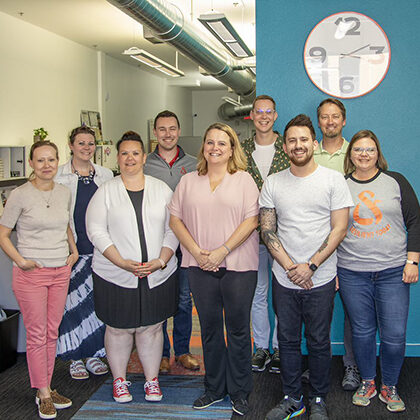The Ripple Effect
For Erik Muckey, executive director of the nonprofit Lost&Found, the ability to potentially prevent suicide comes down to one word:
Information.

“Suicide, in most cases, is preventable when we have the resources necessary for someone to get the help they need," Muckey said. "The reality is, one person with mental health information and training — one person who identifies as a mental health advocate — can impact countless people in their spheres. And the people that person touches will, in turn, have the ability to help others within their spheres who have mental health needs. The impact goes on forever.”
With support from the Foundation, Lost&Found's ripple effect is growing. Since 2010, the Sioux Falls-based nonprofit has been working to help prevent suicide among teens and young adults across South Dakota by gathering data, assembling information and training volunteers.
Over the last decade, more than 750 students across the state have partnered with Lost&Found, either through its advocacy training and peer mentorship programs or as a member of a campus chapter.
“When you think of training students, 750 might not seem like a big number. But that’s 750 people in your communities who are reaching out to five to ten people. The more people we can have talking about it, being aware of it, being an advocate — the greater chance we have to connect people with the help they need. Those ripple effects will last a lifetime," Muckey said.
Peer-to-peer support is key to suicide prevention, Muckey said. But so is having data to understand where the most crucial mental health needs are.
That’s why a recent Community Foundation grant supported Lost&Found’s Campus Resilience Index, an effort to assess the suicide prevention capacity of college and technical school campuses and their communities. The Index identifies areas of strength in prevention and recommends programs, policies and resources that can help reduce suicide risk.
“The Campus Resilience Index is giving campuses a real diagnostic — for the first time ever — of what their prevention capacity is and what they need to do,” Muckey said. “Schools are telling us they’ve been searching for something like this. The data these schools are receiving is helping to open up doors for grant funding, it's helping them apply new policies and get more resources in front of students.”
And, according to recent data, there’s never been a more important time to devote more ideas and resources toward suicide prevention. In 2021, more South Dakotans died by suicide than ever before in recorded history. And today, for those between the ages of 10-19 in the state, suicide stands as the leading cause of death.
“The pandemic really lit a match on a problem that was already brewing. Youth and young adult suicide has been on the rise for the better part of 25 years. The pandemic exacerbated the problem — not just suicide deaths, but the risk factors associated with suicide,” Muckey said.
Since the onset of COVID, we’ve seen an increase in the number of people reporting depression and anxiety. We’ve seen a decline in protective factors such as connectedness, a sense of community, a sense of purpose, sense of certainty. We’ve seen statistics around higher drug and alcohol use. If we don’t solve this, this problem is going to get worse. And this leaves lasting impacts not just for families, but entire communities that we can’t afford.
— Erik Muckey, Executive Director, Lost&Found
Patrick Gale serves as the Foundation's vice president for Community Investment. He said Lost&Found plays a critical role in serving those in need.
“Lost&Found is not only a resource we can look to for current trends, it's also a forward-looking, solutions-minded organization that's committed to driving meaningful change. Lost&Found is truly an asset to our community in so many ways," Gale said.
Muckey said support from the Community Foundation has been key to helping Lost&Found grow and expand its outreach, including the recent addition of Survivors Joining for Hope, a new department offering support to families who have suffered a suicide loss.
"The Foundation is committed to trying new things to help meet needs that are not being met in the community today. We would not have succeeded, or reached the place we’re at today, without that support," Muckey said.
"With our campus chapters and advocacy training programs off and running, along with overarching data from the Campus Resilience Index, we have a better understanding of where services are needed most — and that’s a younger audience. We know we need to be talking about mental health and mental health resources at a younger age, so we are exploring ways to make advocacy education accessible for school districts in our region.”
If you or someone you know is considering suicide, contact the National Suicide Prevention Lifeline at 988.
